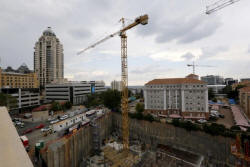South African fourth quarter GDP grows above forecasts
as rating decision nears
 Send a link to a friend
Send a link to a friend
 [March 06, 2018]
By Mfuneko Toyana [March 06, 2018]
By Mfuneko Toyana
PRETORIA (Reuters) - South Africa's economy
grew more than expected at the end of last year as agriculture and trade
recovered, data showed on Tuesday, boosting its chances of avoiding a
potentially debilitating credit ratings downgrade.
The easing of a drought boosted the above-forecast rise in GDP in the
fourth quarter. However, economists said Cyril Ramaphosa's election as
leader of the ruling African National Congress late in the quarter, and
as president last month, has raised expectations that the country will
make economic reforms and possibly keep its last investment grade
rating.
Statistics South Africa said the economy grew 3.1 percent in
October-December, the highest rate since the second quarter of 2016,
after expanding by a revised 2.3 percent in the third quarter.
The growth beat market expectations of a quarter-on-quarter GDP
expansion of 1.8 percent, according to a Reuters poll.

The economy of Africa's most industrialized country has struggled in
recent years, weighed down by low business and consumer confidence amid
political and policy uncertainty.
But investors' sentiment has improved since Ramaphosa replaced Jacob
Zuma, who resigned as head of state following a long series of scandals.
The rand <ZAR=D3>, which was largely flat before the release of the
data, firmed more than 0.8 percent against the dollar to a session high
of 11.7300/dollar. Government bonds <ZAR186=> also firmed.
Finance Minister Nhlanhla Nene said on Monday that growth forecasts were
likely to be raised in October's medium-term budget as the government
completes reforms to boost growth and stabilize ailing state companies.
Ratings firm Moody's - the only major agency that still ranks South
African debt as investment grade - is due to publish its rating decision
this month after placing the country on review for a downgrade. S&P
Global Ratings and Fitch already rate South African debt as "junk".
[to top of second column] |

Construction is seen below the skyline of Johannesburg's upmarket
Sandton suburb, South Africa February 5, 2016. REUTERS/Mike
Hutchings/File Photo

The agriculture industry registered the highest growth at 37.5 percent
quarter-on-quarter, although the expansion was slower than in July-September
when the sector expanded 41.1 percent. The sector is recovering from the severe
drought in 2016.
Trade recovered in the fourth quarter to expand 4.8 percent after shrinking 0.1
percent in the third, while manufacturing grew 4.3 percent, up from 3.7 percent.
"Primary industries had very robust growth and that was emanating from the
amount of crops and harvest from agricultural and fisheries sector," Statistics
South Africa Deputy Director General Joe de Beer said.
Gross domestic product rose 1.5 percent on an unadjusted year-on-year basis in
the fourth quarter versus 1.3 percent in the third quarter. The economy grew by
1.3 percent in 2017 compared with a revised 0.6 percent in 2016.
"Ratings agencies are much more likely to focus on structural reforms, and the
higher growth rate that now looks possible over the coming years," Standard
Chartered Bank's Chief Africa Economist Razia Khan said.
"While not downplaying the economy's still-considerable challenges, this should
create a sound base for future improvements in South Africa's rating."
(Writing by Olivia Kumwenda-Mtambo; Editing by James Macharia and David Stamp)
[© 2018 Thomson Reuters. All rights
reserved.] Copyright 2018 Reuters. All rights reserved. This material may not be published,
broadcast, rewritten or redistributed.
Thompson Reuters is solely responsible for this content.
 |